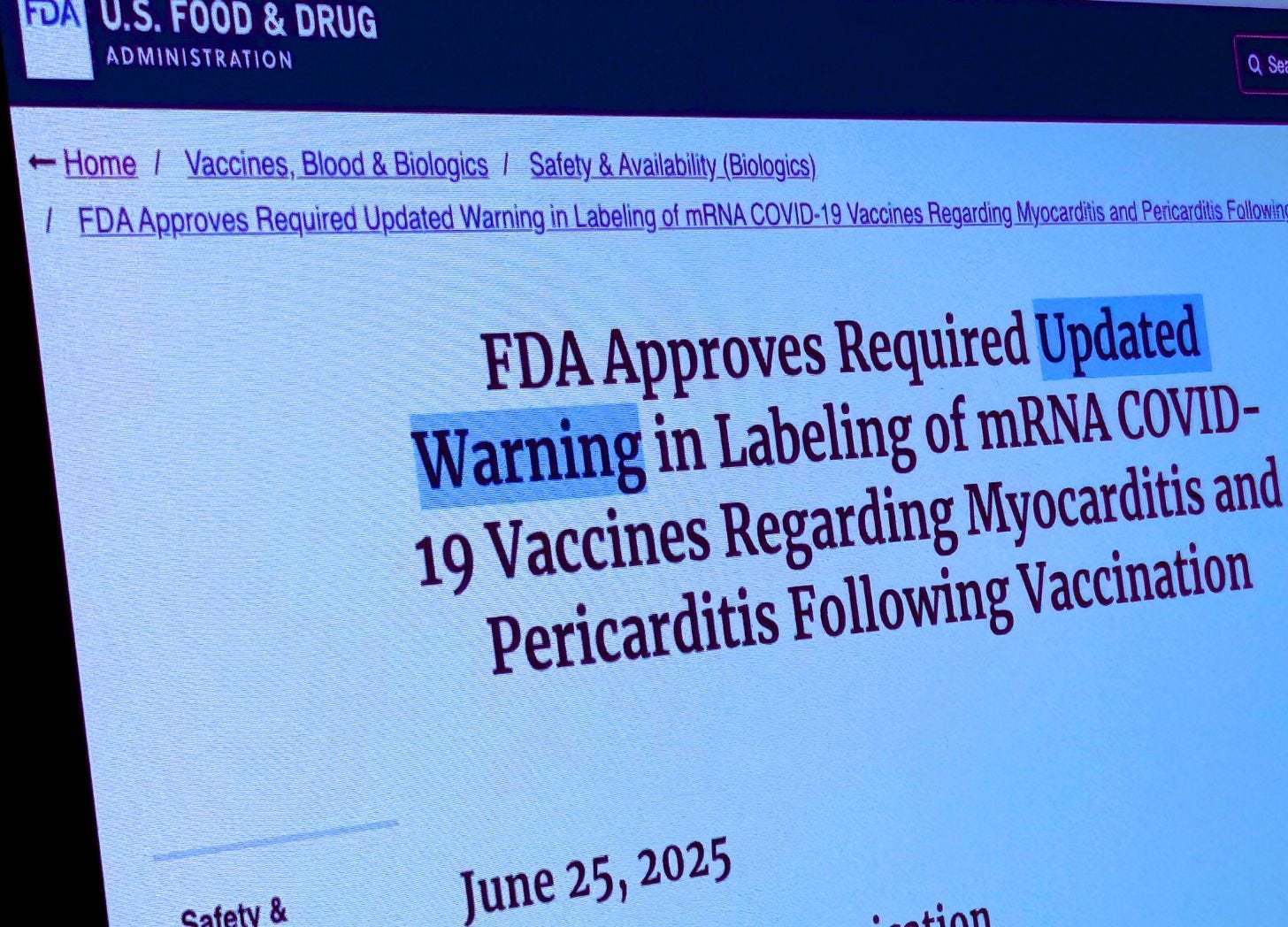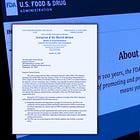FDA Updates COVID-19 Jab Labels With 'New Safety Information About the Risks' of Heart Damage
FDA fails to disclose its own study confirms 82% of myocarditis cases showed heart damage on MRI, 60% had lingering scarring, and nearly half had moderate to severe injury.
The FDA has officially updated the required warning label on Pfizer and Moderna’s COVID-19 mRNA vaccines to include new data confirming that heart inflammation—myocarditis and pericarditis—remains a risk, especially for young males, and that cardiac injury often persists for months in those affected.
The new safety communication reads:
“Purpose: To inform the public and healthcare providers that FDA has required and approved updates to the Prescribing Information for Comirnaty (COVID-19 Vaccine, mRNA) manufactured by Pfizer Inc. and Spikevax (COVID-19 Vaccine, mRNA) manufactured ModernaTX, Inc. to include new safety information about the risks of myocarditis and pericarditis following administration of mRNA COVID-19 vaccines.”
Follow us on Instagram @realjonfleetwood & Twitter/X @JonMFleetwood.
If you value this reporting, consider upgrading to a paid subscription.
The June 25 safety update confirms:
Highest risk group: Males aged 12–24, with 27 cases per million doses following the 2023–2024 mRNA vaccine.
MRI scans from a government-funded study show that vaccine-associated myocarditis patients often retain heart abnormalities 5 months later.
These injuries were documented via cardiac magnetic resonance imaging (CMR)—the gold standard for detecting myocardial damage.
The long-term consequences of these persistent signs of heart injury are “not known,” the FDA admits.
The new warning language was required by the FDA to be added to both the Prescribing Information and the Fact Sheets for Recipients and Caregivers for Comirnaty (Pfizer) and Spikevax (Moderna), including their EUA versions for children.
FDA says the revised labeling reflects the findings of a post-approval U.S. study co-authored by FDA staff and published in September 2024, which tracked approximately 300 myocarditis cases linked to mRNA vaccines.
But keep in mind that vaccine injury tracking systems often significantly underreport adverse events—for example, the CDC’s VAERS system is estimated to underreport by a factor of 100, according to a study commissioned by the U.S. Department of Health and Human Services and conducted by Harvard Pilgrim.
Some study participants still experienced heart symptoms months after vaccination.
The agency also confirmed that both companies are under mandatory post-market obligation to continue investigating long-term heart outcomes from mRNA vaccine-associated myocarditis.
“In addition, as part of the approvals of Comirnaty and Spikevax, each manufacturer is required by FDA to conduct a study to assess if there are long-term heart effects in people who have had myocarditis after receiving an mRNA COVID-19 vaccine.”
These studies remain ongoing.
FDA Cites Study—but Omits Key Findings
The FDA’s new safety communication briefly references a government-funded study on vaccine-associated myocarditis but fails to disclose some of the most alarming results published in the peer-reviewed eClinicalMedicine journal in September 2024.
The FDA-funded study, titled “Cardiac manifestations and outcomes of COVID-19 vaccine-associated myocarditis in the young in the USA,” followed 333 individuals diagnosed with myocarditis after COVID-19 mRNA injection.
Researchers found that a majority experienced long-lasting signs of heart injury, even when initial symptoms appeared mild.
Here’s what the FDA left out:
82% of myocarditis patients showed heart damage on MRI: The study found that 82% of individuals diagnosed with COVID-19 vaccine-associated myocarditis exhibited late gadolinium enhancement (LGE)—a marker of myocardial injury—on cardiac MRI. LGE is widely considered a red flag for heart scarring, linked in other contexts to arrhythmias, cardiomyopathy, and sudden cardiac death.
Heart scarring persisted for months in 60%: At a median of five months post-vaccination, 60% of patients still had visible LGE, meaning the heart muscle damage had not resolved. These findings were observed despite the absence of acute deaths or transplants during the study period.
Nearly half had moderate to severe injury: Among those with LGE, nearly half had more than mild severity, defined by the number of heart segments involved or presence of multifocal/transmural damage.
Some worsened over time: While most patients improved, 5% of those with persistent LGE actually showed worsening at follow-up. One required re-hospitalization, and others developed recurrent myocarditis, arrhythmias, or new ECG abnormalities.
Arrhythmias and EKG changes in follow-up: 4% developed atrial or ventricular tachycardia, and 23% had abnormal EKGs months later, including ST and T wave changes.
Biological mechanism suggests direct damage from vaccine: The researchers theorized that the myocarditis could be caused by immune mechanisms targeting the heart muscle cells directly, potentially due to the spike protein, mRNA payload, or lipid nanoparticle vector. They describe this as “a process that specifically targets cardiomyocytes, leading to injury.”
Risk was highest after first and second doses: Patients were 7.18 times more likely to develop heart injury (LGE) after the first dose and 4.5 times more likely after the second, compared to after a booster dose.
Details regarding young males being most at risk: The likelihood of heart damage was 2.74 times higher in individuals over age 15 and 3.28 times higher in males than females. The average age in the study was just 15.7 years old, and 91% of the patients were male.
Although the FDA’s updated label now acknowledges myocarditis risk and persistent cardiac injury on imaging, the agency withheld key details about the extent and severity of the condition, especially in adolescents and young men.
The long-term significance of this damage remains unknown, according to both the study authors and the FDA itself.
Follow us on Instagram @realjonfleetwood & Twitter/X @JonMFleetwood.
If you value this reporting, consider upgrading to a paid subscription.
For advertising & sponsorship opportunities reaching 230,000+ monthly viewers, contact us by clicking below.














The problem is there is no mandated requirement that the medical person administrating the mRNA injection is required to disclose the risks!
Why do we continue to trust RFK, Jr., when he refuses to ban this poison that has killed and maimed so many American's?